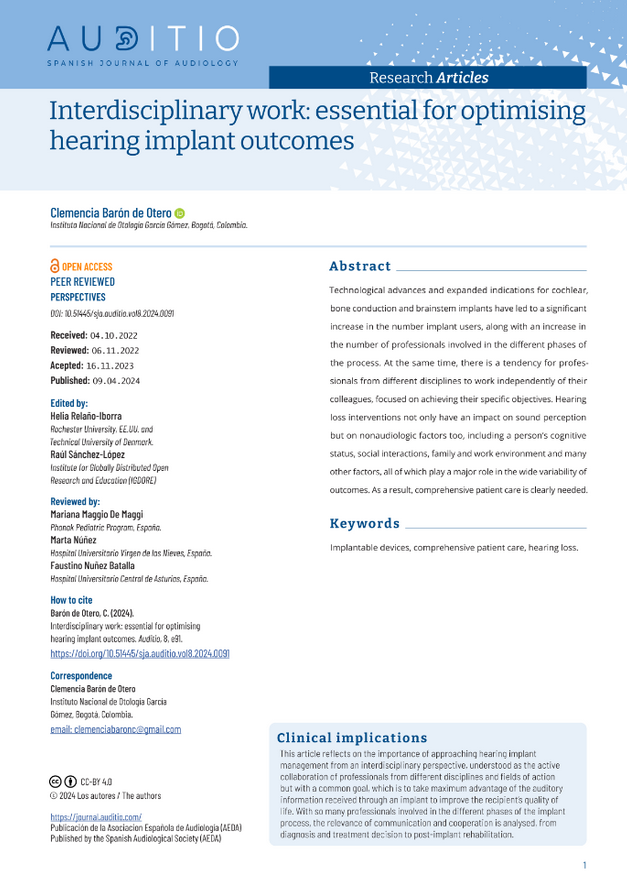Association between emotional state and tinnitus severity in a sample of 53 participants
Emotional state and tinnitus severity
DOI:
https://doi.org/10.51445/sja.auditio.vol8.2024.105Keywords:
Tinnitus, anxiety, depression, THI, TFI, HADSAbstract
Tinnitus is the perception of sound in the absence of an identifiable internal or external sound source. This symptom affects approximately 14% of the adult population, with prevalence increasing with age. In this study we evaluated the association between emotional state and tinnitus severity in a sample of 53 participants before they started sound therapy. To assess emotional state, the Hospital Anxiety and Depression Scale (HADS) was used, divided into its two subscales for anxiety (HADA) and depression (HADD). To assess tinnitus severity, the Tinnitus Handicap Inventory (THI) and Tinnitus Functional Index (TFI) were used. The sample population showed a strong positive correlation between the HADA and HADD scales and the THI and TFI questionnaires (r = 0.80 and 0.81, respectively). The results corroborate the association between emotional state and tinnitus severity, emphasising the need for an interdisciplinary treatment approach that covers both physical and emotional aspects.
Downloads
Visibility and Altmetrics
Metrics
Global Statistics ℹ️
|
1296
Views
|
2751
Downloads
|
|
4047
Total
|
|
References
Bhatt, J. M., Bhattacharyya, N., & Lin, H. W. (2017). Relationships between tinnitus and the prevalence of anxiety and depression: Tinnitus and Mood Disorders. The Laryngoscope, 127(2), 466–469. https://doi.org/10.1002/lary.26107.
Cobo, P., Cuesta, M., & de la Colina, C. (2021). Customised enriched acoustic environment for sound therapy of tinnitus. Acta acustica. European Acoustics Association, 5, 34. https://doi.org/10.1051/aacus/2021028.
Cuesta, M., Garzón, C., & Cobo, P. (2022). Efficacy of sound therapy for tinnitus using an enriched acoustic environment with hearing-loss matched broadband noise. Brain Sciences, 12(1), 82. https://doi.org/10.3390/brainsci12010082.
Eggermont, J. J., & Roberts, L. E. (2004). The neuroscience of tinnitus. Trends in Neurosciences, 27(11), 676–682. https://doi.org/10.1016/j.tins.2004.08.010.
Fernández, M., Cuesta, M., Sanz, R., Cobo, P. (2023). Comparison of Tinnitus Handicap Inventory and Tinnitus Functional Index as Treatment Outcomes. Audiology Research, 13, 23–31. https://doi.org/10.3390/audiolres13010003.
Hébert, S., Paiement, P., & Lupien, S. J. (2004). A physiological correlate for the intolerance to both internal and external sounds. Hearing Research, 190(1–2), 1–9. https://doi.org/10.1016/S0378-5955(04)00021-8
Jarach, C. M., Lugo, A., Scala, M., van den Brandt, P. A., Cederroth, C. R., Odone, A., Garavello, W., Schlee, W., Langguth, B., & Gallus, S. (2022). Global prevalence and incidence of tinnitus: A systematic review and meta-analysis. JAMA Neurology, 79(9), 888. https://doi.org/10.1001/jamaneurol.2022.2189.
Jastreboff, P. J. (1990). Phantom auditory perception (tinnitus): mechanisms of generation and perception. Neuroscience Research, 8(4), 221–254. https://doi.org/10.1016/0168-0102(90)90031-9.
Langguth, B., Landgrebe, M., Kleinjung, T., Sand, G. P., & Hajak, G. (2011). Tinnitus and depression. The World Journal of Biological Psychiatry: The Official Journal of the World Federation of Societies of Biological Psychiatry, 12(7), 489–500. https://doi.org/10.3109/15622975.2011.575178.
Langguth, B., & Elgoyhen, A. B. (2012). Current pharmacological treatments for tinnitus. Expert Opinion on Pharmacotherapy, 13(17), 2495–2509. https://doi.org/10.1517/14656566.2012.739608.
Møller, A. R. (2007). The role of neural plasticity in tinnitus. En Tinnitus: Pathophysiology and Treatment (pp. 37–544). Elsevier.
Pattyn, T., Van Den Eede, F., Vanneste, S., Cassiers, L., Veltman, D. J., Van De Heyning, P., & Sabbe, B. C. G. (2016). Tinnitus and anxiety disorders: A review. Hearing Research, 333, 255–265. https://doi.org/10.1016/j.heares.2015.08.014.
Weidt, S., Delsignore, A., Meyer, M., Rufer, M., Peter, N., Drabe, N., & Kleinjung, T. (2016). Which tinnitus-related characteristics affect current health-related quality of life and depression? A cross-sectional cohort study. Psychiatry Research, 237, 114–121. https://doi.org/10.1016/j.psychres.2016.01.065.
Zigmond, A. S., & Snaith, R. P. (1983). The hospital anxiety and depression scale. Acta Psychiatrica Scandinavica, 67(6), 361–370. https://doi.org/10.1111/j.1600-0447.1983.tb09716.x.

Downloads
Published
How to Cite
License
Copyright (c) 2024 Marta Fernández, Ricardo Sanz, María Cuesta, Pedro Cobo

This work is licensed under a Creative Commons Attribution 4.0 International License.
All articles will be published under the open Creative Commons Attribution (CC-BY) license. This license allows others to share and adapt the content, even for commercial purposes, as long as appropriate credit is given to the authors and the journal. By submitting their manuscript, authors retain copyright but grant the journal the right to make the first publication under this license.
More information about this license is available at: https://creativecommons.org/licenses/by/4.0/
Articles published between 2001 and 2020
The texts published in this journal in the section "AUDITIO 2001-2020" are subject - unless otherwise indicated - to a Creative Commons Attribution 3.0 Spain license. You can copy, distribute, communicate them publicly, make derivative works and commercial uses provided that you acknowledge the credits of the works (authorship, name of the journal, publishing institution) in the manner specified by the authors or by the journal. The full license can be consulted at http://creativecommons.org/licenses/by/3.0/es/deed.es.









